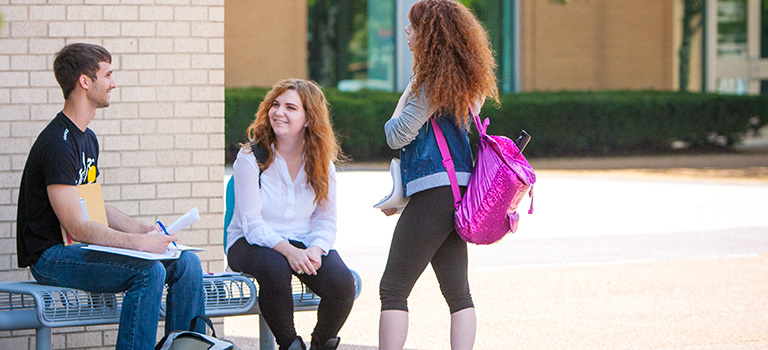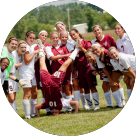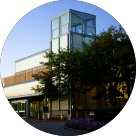- Average Class Size: 17
- Student to Faculty Ratio: 15:1
- Financial Aid: 43% of Academic Year 2022-2023 students received some form of financial aid.
- Intercollegiate Teams: Men's Baseball; Women's Fast-Pitch Softball; Men's Soccer; Women's Soccer; Men's Cross Country; Women's Cross Country; Men's Track and Field; Women's Track and Field
- Mascot: Cougars. Mascot name: Scooter McCougar
- School Colors: Maroon and gray
- Clubs/Organizations: More than 15 academic, leadership and social organizations are available to students, including Student Government Association, Multicultural Student Association, and Phi Theta Kappa, the national two-year college honor society.
- Students Who Work: According to the Community College Survey of Student Engagement (CCSSE), 77% of SCC student respondents indicated that they work, including 26% who indicated that they work more than 30 hours per week.
- Programs: SCC offers a college transfer program with over 24 areas of interest and more than 45 career programs in business, engineering, information technology, health, child care and social services, law enforcement, office professions; plus continuing education, developmental and business and industry training programs. SCC offers more than 100 online courses.
- Degrees, Certificates: Associate of Arts (college transfer), Associate of Arts in Teaching (college transfer), Associate of Fine Arts (college transfer), Associate of Science (college transfer), Associate of Applied Science (work-ready), Certificate of Achievement (work-ready) and Certificate of Specialization (work-ready).
- Accreditation: Accredited by the Higher Learning Commission, hlcommission.org.
- Admissions: Open admissions; selective admission to allied health programs.
- Graduate Employment: According to the 180-Day Annual Graduate Survey, 54% of graduates report that they use the skills and knowledge from their SCC degree or certificate in their current job (this survey is sent to select programs and the percentages are based on the number of respondents(227)).”
- Location: Main Campus: Central St. Charles County – 4601 Mid Rivers Mall Drive, Cottleville, Mo., Dardenne Creek Campus: West St. Charles County - 1 Academy Place, Dardenne Prairie, Mo.
- Land and Buildings:Main Campus: 228 acres; 12 buildings; 550,000 square feet. Dardenne Creek Campus: 28 acres; 2 buildings; 81,281 square feet.
- District/Service Area: The SCC College Taxing District includes the school districts of Francis Howell, St. Charles, Wentzville, Fort Zumwalt and Orchard Farm, including nearly all of St. Charles County.
- Extended Service Area: Includes St. Charles, Warren, Callaway, Lincoln, Montgomery and Pike counties.
- Fiscal 2022-23 Operating Budget: $45,416,000
- 2023 Local Tax Rate: Operating levy is 13.68 cents and the debt service levy is 3.08 cents, for a total levy of 16.76 cents per $100 assessed valuation.
- SCC is an equal opportunity institution.
- SCC is a tobacco-free campus.
- SCC Mission: SCC serves our community by focusing on academic excellence, student success, workforce advancement, and life-long learning within a global society. We celebrate diversity and we enrich the economic and cultural vitality of the region by providing an accessible, comprehensive, and supportive environment for teaching and learning.
- SCC Audited Financial Statements for FY2022-2023: Independent auditors' report.
Recently Visited Pages
Take advantage of this at-a-glance look at the pages on the SCC website you most often visit. Use this as a tool to navigate quickly to info you need the most. Take it one step further and click the star in the top right corner to ensure your favorite pages remain on your list of Visited Pages.
Fast Facts
St. Charles Community College is the choice of 1 in 5 St. Charles County high school graduates.

Established in 1986 with the first classes held in 1987, St. Charles Community College is a public, comprehensive two-year community college with associate degrees and certificate programs in the arts, business, sciences and career-technical fields. SCC provides workforce training and community-based personal and professional development as well as cultural, recreational and entertainment opportunities.
The beautiful 12-building main campus has won architectural awards for its innovative, contemporary "educational village" design. The SCC-Dardenne Creek campus was established in 2017 and is home to the Center for Healthy Living and agriculture and culinary collaborative space.
St. Charles is ranked among the top 50 places to live in the United States. According to Money Magazine, “the people of St. Charles appreciate their city as a nice place to raise kids, with great schools, little crime, and reasonably priced homes.”
Student Enrollment
| Students | Numbers |
| Credit Enrollment | |
|---|---|
| Fall 2022 Semester credit hours | 62,255 |
| Fall 2022 Semester headcount | 5,901 |
| Male | 41% |
| Female | 59% |
| Full-time (12+ credit hours) | 54% |
| Part-time (<12 credit hours) | 46% |
| Average age of students | 22 |
| Students under age 18 | 12% |
| Traditional students (age 18-21) | 61% |
| Nontraditional students (age 22+) | 19% |
| Minority students | 24% |
| Main county of origin – St. Charles County | 74% |
| Percent of Fall 2022 St. Charles County high school graduates attending SCC | 20% |
| Full-time/Part-time | Numbers |
| Full-time faculty | 101 |
| Part-time faculty | 287 |
| Full-time staff | 167 |
| Part-time staff | 17 |
| (Data Accurate as of 12/18/2023) | |
Creation of the District
Voters created the Junior College District of St. Charles County, Mo., in an April 1, 1986, election, making it Missouri's 11th community college district. Effective Feb. 19, 1987, the name of the district was officially changed to St. Charles County Community College District. Selected as the first president was Dr. Donald D. Shook, who had previously served as president of two other Missouri community colleges.
The first St. Charles County Community College classes were held in the summer of 1987 with about 400 students. By the fall 1987 semester, 1,547 students were enrolled in credit classes, and other non-credit, continuing education programs were taking shape. The college operated out of several temporary locations for five years while continuing to plan for a permanent campus. Enrollment grew rapidly as the college developed educational programs and services in answer to community needs.
Birth of Campus
The Board of Trustees, in February 1989, chose a 135-acre tract that was destined to be located directly in the county's center of population growth for the year 2000. The site on Mid Rivers Mall Drive had easy access to major interstate highways, and its location positioned the college to be close to home for thousands of area residents.
Ground breaking for Phase 1 of building construction took place on June 6, 1990. The new four-building campus was officially dedicated in a public ceremony on Jan. 26, 1992, and a new semester began without a hitch.
Planning continued for future campus growth to meet rapidly increasing enrollment. By fall of 1992, the number of students in credit classes had climbed to 4,631. At the same time, the continuing education programs were growing by leaps and bounds, serving thousands of people in non-credit programs each year, including business and industry partnerships, personal and career enrichment classes, and community outreach services for persons of all ages.
Campus and Program Expansion
In an April 1993 election, voters in the local college district approved building Phase 2 of the campus. The college broke ground in March 1994 for the $10 million, two-building construction project that included the Donald D. Shook Fine Arts Building and a Continuing Education and Academic Center. Later, matching funds from a 1994 statewide bond issue allowed SCCCC to open a Child Development Center in spring of 1996.
Highlights of the decade included the addition of a number of new vocational/technical programs, an online library and campus-wide links to the Internet, and the opening in 1995 of the Phase 2 buildings.
When Dr. Shook retired in November 1996, Dr. John M. McGuire took the helm as SCCCC’s new president. As the college celebrated its 10-year anniversary, enrollment was again on the rise. Between 1996 and 1999, student head count in credit classes increased more than 19 percent, with 5,565 students in fall 1999 – the largest single-semester enrollment to date. And in the 1999-2000 academic year, more than 23,000 participants were served in non-credit continuing education programs.
Building for the Future
So that the college would have the tools and facilities to serve a rapidly growing St. Charles County community, trustees once again looked to the future – this time with plans to build Phase 3 of the campus. In an election on April 7, 1998, voters approved the $13.75 million project, including a College Center, aTechnology Building, an addition to the Child Development Center, athletic fields and parking lots. The college also purchased several adjacent parcels of property in 1998 and 1999, adding 87 acres to bring the campus size up to 222 acres.
New Century of Learning
In the dawn of a new century, the college community focused clearly on enhancing programs and facilities, staying on the leading edge of technology, and keeping the highest priority on excellence in teaching and learning. Opening Phase 3 of the campus in January 2001 included celebrations that invited the community to "come learn with us" in a millennium of progress and promise. Later that year, the college's name was shortened to St. Charles Community College (SCC).
A 2002 mission statement revision reflected the “life-changing opportunities for personal growth and professional success” that have come to be the hallmark of this vibrant young college. That same year, SCC received the maximum 10-year accreditation from the Higher Learning Commission of the North Central Association of Colleges and Schools. In 2003, trustees took the opportunity to purchase another contiguous parcel of land, increasing the total campus to 235 acres.
More Room to Grow
By 2004, student credit hour enrollment at SCC was growing more than three times faster than the population of St. Charles County, and the college neared maximum classroom occupancy. Fall credit class enrollment climbed toward 7,000 students, including more than one-fourth of all St. Charles County high school graduates. Over the course of a year, SCC was serving nearly 10,000 individual students in credit classes. In addition, the Corporate & Community Development Division had more than 33,000 annual enrollments in non-credit programs and activities. Trustees once again looked to the future.
In April 2004, college district voters approved a $23 million bond issue to further expand the campus with additional buildings, more parking, renovations and roadways. Another $2 million was added to the project through the sale of revenue bonds to be funded through bookstore auxiliary services.
Ground breaking for Phase 4 buildings was held in June 2005. In August 2006, the college opened its three-building campus addition: the Café-Bookstore, the Visual Arts Building, and the Daniel J. Conoyer Social Sciences Building. More than 25 classrooms, 10 art studios, a 250-seat auditorium, an enlarged learning center, and spaces for students to relax, refresh and study were part of the expansion project.
Celebrating 20 Years
In October 2006, the college dedicated the new buildings and celebrated its 20th year as a gateway for success for thousands of students and families. In January 2007, SCC took on a health-focused leadership role by becoming only the second community college or university in Missouri to establish a completely tobacco-free campus. Later that year, SCC’s Cougar mascot got a face and a seven-foot body, and was named Scooter McCougar. Scooter soon became a fixture at campus and sporting events.
Focusing on Student Success
A new mission statement was developed in 2008 to reflect the college’s value to the students and to the community. In 2009, SCC made a push to be more “green,” taking steps to increase its energy efficiency and stepping up its recycling efforts.
Celebrating the 25th Anniversary
In April 2011, the college kicked off its 25th anniversary celebration, marking 25 years from the 1986 election.
SCC said goodbye to retiring President John McGuire in October 2011, and welcomed in a new era of leadership with SCC’s third president, Ronald Chesbrough, Ph.D., previously vice president for student affairs at Hastings College in Hastings, Neb.
In April 2012, notification was received from the Higher Learning Commission (HLC) that the college had been re-accredited for another 10 years.
Long-Range Planning
After the 25th anniversary celebration drew to a close in June 2012 with a tree planting ceremony, 25 years from when the first classes began at SCC in 1987, a Long-Range Planning initiative began.
With feedback from across campus and from community members, new mission, vision and value statements were announced in the fall of 2013 and a strategic plan was developed.
New Collaborations, Better Access
Areas for growth were identified, and in response to the high interest in nursing and allied health programs, SCC’s trustees and leaders were determined to meet the growing demand for careers in the health care field.
A collaborative initiative with Lindenwood University helped launch the new LU/SCC Center for Nursing and Allied Health Sciences located at #1 Academy Place in Dardenne Prairie, former site of Barat Academy, a 69,000-square-foot building purchased by Lindenwood in September 2012. Lindenwood and SCC signed the collaborative initiative in March 2013 and SCC is leasing approximately 26,000 square feet of space, including space for the state-of-the-art virtual hospital. A ribbon cutting ceremony was held in August 2013 and the new center now houses the SCC associate degree nursing program, as well as its Practical Nursing, Occupational Therapy Assistant, Health Information Technology and Health Occupations programs.
On the main campus, construction of a .67-mile walking and biking trail was completed by Great Rivers Greenway in the fall of 2013 as part of the Dardenne Greenway, linking trails from Legacy Park in Cottleville to Woodlands Sports Park and Rabbit Run Park in St. Peters.
Long-Range Planning efforts continue so that SCC will keep pace with demand in providing a quality, affordable college education for future generations.
Chipping Away at the Community College Stigma
In fall 2014, SCC adopted Missouri Campus Compact’s Semester of Service Program to encourage service-learning volunteerism. Service learning provides students with a well-rounded educational experience while benefiting the community.
SCC created an Honors Program to serve the advanced learner in 2015. Thirty students, both new and returning, enrolled in the honors program in its first semester. SCC honors students gain access to early registration, mentorship and academic guidance from Honors Council members and receive invitations to special events throughout the semester. Students also receive honors recognition on their transcripts at graduation.
30 year brings change and celebration
The college observed its 30th anniversary starting April 2016. During its milestone year, the college welcomed the new leadership of Dr. Barbara Kavalier as president in August, after Dr. Ron Chesbrough resigned in March.
Under the leadership of Barbara Kavalier, Ph.D., SCC purchased its Dardenne Creek Campus, which is home to the college’s Center for Healthy Living. The SCC Board of Trustees approved the purchase contract at their Dec. 5, 2016, meeting, and SCC finalized the purchase of the property for $9.45 million on Feb. 24, 2017. The campus was dedicated on May 2, 2018. The Center for Healthy Living houses SCC’s current and future nursing and allied health programming as well as a new agriculture program and other workforce training.
On-Campus Housing Offered to Students
On April 29, 2019, St. Charles Community College and SCC Housing Partners, LLC, broke ground on a new student housing facility on campus. In January 2020, the first students moved into the Campus Lake Apartments, ushering in a new era for SCC as a residential campus. The complex is fully furnished and can house up to 130 students.
The public-private partnership allowed the college to begin offering students on-campus housing while saving taxpayers the significant cost of building it. The Campus Lake Apartments are located on the west side of campus.
New SCC Agriculture and Food Science Collaborative Space Dedicated by Missouri Governor.
On Aug. 26, 2020, Missouri Governor Mike Parson helped dedicate the new SCC agriculture and food science building on the Dardenne Creek Campus. The building, previously a gym, was transformed into a space that features a bakery, test kitchen, commercial kitchen and brewing lab. It will house future credit programs in culinary arts, brewing science and nutrition. The current agriculture program will utilize the building and surrounding fields for crop research and development.
Proposition Community College Overwhelmingly Supported by Community.
On Aug. 4, St. Charles County residents passed Proposition Community College, a $30 million no-tax increase bond issue. The bond issue passed with more than 67 percent of the vote. Proposition CC consists of four main initiatives which include the modernization and expansion of facilities needed to meet the needs of students in areas of workforce/technical training, STEM education, student support services and campus safety.
1986
April – College district established; Board elected
October – Dr. Donald D. Shook becomes first president
1987
June – First credit classes held
1988
August – First students graduate
November – $24 million bond approved to build permanent campus
1989
February – 135-acre permanent campus site chosen
1990
June – Phase 1 campus ground breaking
1991
August – Accredited by North Central Association of Colleges and Schools
December – College relocated to new campus
1992
January – Phase 1 campus dedication
May – Gala Grand Opening campus celebration
October – IRS approves new SCC Foundation
1993
April – $10 million bond approved for Phase 2
1994
March – Phase 2 campus ground breaking
1995
November – Phase 2 dedication
1996
February – First season begins for men’s baseball, women’s fast-pitch softball
May – Permanent Child Development Center opens
October – Dr. Shook retires
November – Dr. John M. McGuire becomes president
1998
April – $13.75 million bond issue approved
1999
May – Phase 3 campus ground breaking
2001
January – Phase 3 dedication
April – College name shortened
2002
October – College receives 10-year accreditation
2004
April – $23 million bond approved for Phase 4
2005
June – Phase 4 campus ground breaking
2006
October – Phase 4 dedication
2007
January – College becomes tobacco-free
2009
August – First season of men’s and women’s soccer teams
2010
October – Dr. John M. McGuire announces fall 2011 retirement
2011
March – Presidential search begins
April – 25th anniversary celebration begins
October – Dr. Ronald Chesbrough becomes president
2012
April – Accredited by HLC North Central Association of Colleges and Schools
2013
August – LU/SCC Center for Nursing and Allied Health Sciences opens with virtual hospital ribbon cutting
2014
October – Women’s Soccer qualified and participated in the NJCAA national tournament
2015
April – College Meadows Park opens, ribbon cutting
August – Honors Program launch
2016
March – Dr. Ron Chesbrough resigns, presidential search underway
April – 30th anniversary celebration begins
August – Dr. Barbara Kavalier becomes president
2017
February – SCC purchases Dardenne Creek Campus
2018
May – SCC dedicates Dardenne Creek Campus, cuts ribbon for Center for Healthy Living
2019
April - SCC breaks ground on Campus Lake Apartments
October - Construction begins on new agriculture and culinary collaborative space on the SCC-Dardenne Creek Campus
2020
January - First students move into Campus Lake Apartments
August - St. Charles County residents pass Prop CC
August - Governor Mike Parson helps dedicate new agriculture and food science collaborative space on the SCC-Dardenne Creek Campus
2021
February - Groundbreaking held for Prop CC-funded Department of Public Safety Building on campus









